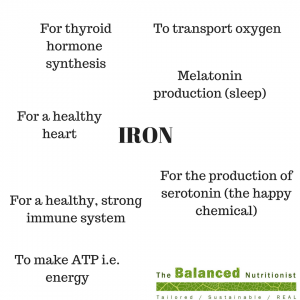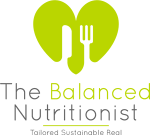Nutritional medicine is a very effective treatment option for women’s health complications.
Once you understand and comprehend that macro nutrients (that’s protein, carbohydrates and fats) are the raw materials required for ALL organs, cells and hormones in the body then it’s easy to see why nutrition is critical.
In addition, it’s all of those micro nutrients (vitamins and minerals) that enable the reactions and processes to take place in our body.
Enough biochemistry, here are some of the complications commonly facing women and how I can help you in the area of women’s health nutrition.

Iron deficiency anaemia is a major problem for about 20% of Australian women. Symptoms include exhaustion, low libido, infertility, irregular periods, shortness of breath and headaches. Women with low iron are often advised to take inferior iron supplements that cause constipation and are poorly absorbed. Compliance is low and so the problem continues.
A supplement might be necessary, but there are other cofactors to consider here as well. B12 and folate are often deficient when iron is low and this needs to be corrected through diet and supplementation. The diet overall needs to be addressed – after all, the cause of the issue in the first place is a lack of appropriate nutrients in the diet.
Digestion can play a very important role here as well. If the gut is inflammed you won’t be absorbing iron very well anyway, even if there is plenty in the diet. Inflammation in the gut is associated with undiagnosed coeliac, newly diagnosed coeliac, IBS or anyone eating food that does not agree with them.
High stress can affect our absorption of nutrients through the gut as well. Stress downregulates the parasympathetic nervous system which is responsible for digestion and absorption of nutrients. Sometimes, addressing an iron deficiency at its very core may mean minimizing stress, supporting healthy sleep and again optimizing digestion. Its always about getting to the root cause.
Iron is involved in so many processes in the body – just a few are listed in this picture. Anaemia is not something to be ignored.
PCOS, ENDOMETRIOSIS AND REGULATING CYCLES
Polycystic ovarian syndrome will affect up to 1 in 5 women, making it one of the most common hormonal irregularities experienced by women. This is one of my favourite conditions to treat! It is so responsive to diet and nutritional medicine intervention and its especially important to consider nutrition intervention in adolescents suffering from PCOS. PCOS is very closely related to insulin resistance so the core approach will involve a reduction in sugar and moderating carbohydrates in general, whilst ensuring protein and healthy fats are core components of the diet. There are some well researched supplementation options for more extreme cases of PCOS too. These can assist with regulating ovulation and the period which will be particularly important if having a baby is the end goal. You can read more about PCOS treatment here.
Nutritional medicine also offers many evidence based intervention options in the management of endometriosis. Conventional medicine generally encourages the removal of endometriosis by laparoscopic surgery – nutritional medicine can assist in keeping endometriosis growth at bay for longer as we know that endometriosis generally continues to reappear and surgeries are redone every few years depending on its severity. Managing endometriosis is obviously critical during preconception to enhance a couple’s chance of natural fertility.
Many women won’t have a diagnosed hormonal condition as such but will simply suffer from debilitating pain or horribly heavy or unpredictable cycles. In natural health, we view the period as a report card on health status. Pathology testing or urinary hormone testing can give us a good picture of which hormones may be out of balance. From here, we can choose the appropriate interventions to promote healthy oestrogen / progesterone balance, ovulation, appropriate testosterone levels etc. Also consider that all of these conditions are characterised by inflammation. If we can minimize inflammation via the diet, ‘systemic’ inflammation (i.e. general inflammation throughout the body) will decrease and many symptoms will improve.
ACNE
Acne is often (not always) an indication of hormonal imbalance. It may also simply be poor dietary choices – excessive sugars (sugars are good at hiding in our food!), or intolerances (dairy is a common one) can cause skin to erupt into angry pimples. Alternatively, low nutrient density in the diet specifically a lack of vitamin C, A, E and zinc will create an environment for acne to thrive. The right balance of omega 6 to omega 3 fats is also critical. Again, you can start to understand how effective nutritional medicine and dietary changes can be in assisting with clear, glowing skin. My job is to ascertain the cause and treat that accordingly.
This is not a complete list of issues that women’s health nutrition can assist with. Us women are complex! If you are unsure if I can help you, just fill in the contact form and I can get back to you :).
